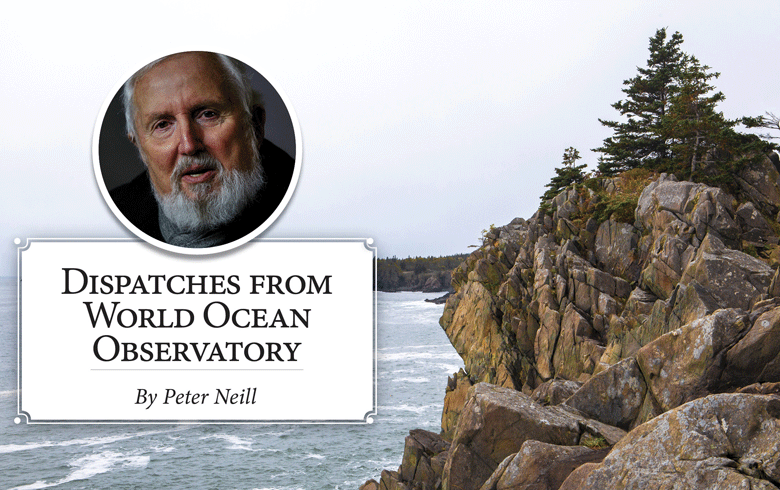One of the great ocean experiences is the panoply of the night sky. A vast darkness, shaped by intimations of residual clouds, the crescent moon, complicated by distant planets and stars in their constellations, swept into the arc of the Milky Way, made exhilarating and mysterious by the potential of the northern lights—all as metaphysical and meaningful as pure nature.
I have been anchored offshore Downeast for the past few nights, cool and clear, with the sense of solitude and isolation from the travails of the world diminished, distant, sublime.
Solitude is such a privilege. We live among maddening crowds. We retreat to the ocean as a place apart, where the intrusion of circumstance can be held, briefly, at bay.
She felt violated and outraged … by the sudden unnatural modification of the night sky…
How often do poets and artists look to the sky for metaphors of freedom and peace? How often do we marvel at the stars when seen in unexpected places? What would life be for sailors, nomads, city-dwellers, creative spirits, if there was no night sky, no stars?
A friend told me a story the other day about a recent evening camping in Montana, where she had laid down on the ground below that vast western sky, far from the ocean, but inspiring of oceanic feeling. She described a night as wide and significant as if she were alone, disconnected from all the complexities of life, as if she was at sea, with only herself for company, only her sensibility as companion.
I expected some personal revelation to follow. But what happened to her next was unexpected and disruptive: the arrival of a cluster of lights, moving in company, explained as a cluster of some 50 low-level satellites launched by an entrepreneur, moving as a coordinated technological cluster, as the beginning of an industrial solution to bring wireless connection, for profit, to every individual on earth—in effect, an intended system for universal connection, global communication, and logistical efficiency that would, indeed, transform the world we live in.
She felt violated and outraged, not just by the sudden unnatural modification of the night sky, not just by an invasion of her solitude and privilege, but also by the implication that those things might now never be possible again, for anyone, given the potential of direct surveillance and manipulation of things on Earth by a power over which she had no control.
The irony is inescapable. The first ocean navigators used the patterns of the stars to locate themselves in an uncharted ocean, observed patterns of experience that provided certainty of place and direction as they explored and traded across the world.
Those satellites are the tools of modern navigation, global positioning systems, that place us precisely in time and space to an extent that we know exactly where we are. Those satellites enable instant communications, cultural and political exchange, guide our ships at sea and our harvesters on land. Those satellites enable us to share art and culture worldwide and to guide the weapons of war to a lone enemy anywhere.
This is the new contradiction now enabled as a modern “music of the spheres.” There may be universal betterment there, just as there may be specific evil easily enabled by a tactic and a keystroke.
Who gave that entrepreneur the right to modify our lives in such a way? Who gave him the authority to change the night sky? Who gave him permission to profit from the privatization of space? Who gave him approval to impose his individual ambition and vision upon our thoughts and oceanic feelings?
My friend was upset; I am incensed. This new reality is the apotheosis of man’s consumption and corruption of nature.
As we deal with the global consequence of the values, structures, and behaviors of this attitude—as we see the burned and desiccated land, the acidified ocean, the polluted atmosphere, the outcome over time of this corrupting approach—how can we allow one man to supersede all authority, national and international, to launch this invasion upon us? It is cosmically extra-legal, beyond even the hand of God.
I thought about this floating on the ocean that connects all things. Dream-state? Or nightmare. Prospect of the final insult to the natural world that sustains us?
Peter Neill is director of the World Ocean Observatory, which produces weekly radio essays heard on WERU-FM, 89.9, on podcast at apple.com/us/podcast/world-ocean-radio/id425361249, and at www.worldoceanobservatory.org/world-ocean-radio. He lives in Sedgwick.





